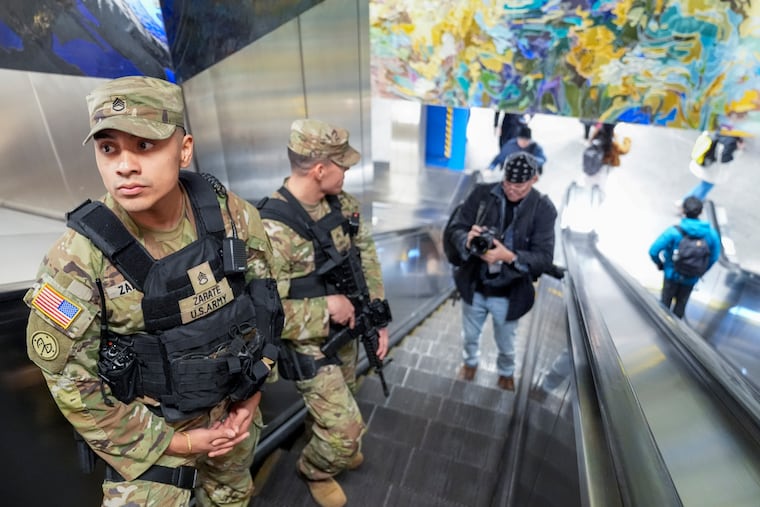Why Pa. should deploy the National Guard to SEPTA right now
Unless conditions improve, SEPTA’s survival is at stake. Deploying the National Guard can bring riders back and make SEPTA safe for everyone.

When a bus shows signs of a mechanical problem, you call a mechanic. The goal is to do preventive maintenance, rather than waiting for a complete failure. But if buses and stations are plagued by a breakdown of civil society, who do you call?
Every day, SEPTA employees see criminal acts, fare evasion, people experiencing mental illness, homelessness, or drug addiction. The union I lead, Transport Workers Union Local 234, which represents 5,000 SEPTA workers, has been sounding the alarm that unless conditions improve, the very survival of the public transit system is at stake.
In response, we have been asked by image-conscious SEPTA managers and other public officials to tone things down and not draw too much attention to the transit agency’s challenges. During a Philadelphia City Council hearing on SEPTA safety issues in November 2021, I pushed back against this “head in the sand” approach and accused state and city elected officials of “leading from behind.”
In the 28 months that have passed since that City Council meeting, little has changed.
Some of our city leaders recently showed up at a crime scene following four shootings in one week involving SEPTA buses. Standing near the site where eight students were sent to the hospital with gunshot wounds and a bus was riddled with bullets, Police Commissioner Kevin Bethel, Mayor Cherelle L. Parker, and District Attorney Larry Krasner promised to catch the criminals and protect the riders.
This is reactive, not proactive.
Similarly, Republican leaders in the state Senate introduced Act 40 last year, calling for a special prosecutor to pursue those who commit crimes on SEPTA or within 500 yards of SEPTA property. That act has now been signed by the governor, but there is no special prosecutor in place, and there probably won’t be for a long time because Krasner has challenged the legality of Act 40 in court.
From the vantage point of SEPTA workers, this recent attention by state and local leaders to safety threats is well-intentioned but misguided.
Rather than focusing on prosecution and punishment after transit crimes are committed, the emphasis should be on doing the security equivalent of “preventive maintenance,” or deterrence. The goal should be to act before these violations occur, not after.
Two years ago, our union called for the state to assist the thinly staffed and often overwhelmed SEPTA Transit Police Department with a show of force by sending in the National Guard to help patrol SEPTA’s buses, trains, and trolleys. State leaders listened to our request at the time, and looked at us like we needed our heads examined. They were concerned about poor optics.
We believe the temporary deployment of the National Guard can serve as a powerful deterrent, and buy time for the system to fully recover. Studies across the country show that as ridership goes up, crime and other societal problems go down. Deploying the National Guard can bring riders back and make SEPTA safe for everyone.
Earlier this year in New York City, Mayor Eric Adams sent 1,000 police officers to the transit system, and not long after, New York Gov. Kathy Hochul assigned 750 National Guard members and 250 state troopers to the city’s subways. Hochul also pledged an additional $20 million to increase the number of mental health teams working on the subways. SEPTA does similar outreach, but much more is needed.
According to the Federal Transit Administration, the rate of assaults on transit operators nationwide started rising before the pandemic. Assaults on transit workers increased by 121% between 2008 and 2021, and that’s probably an undercount.
At the insistence of our union, SEPTA has now agreed to install protective shields around bus operators, keeping them safe from those seeking to do harm. Philadelphia isn’t the first city to do this. London bus drivers work in an enclosed cockpit on new buses. Los Angeles also has added plexiglass shields to its Metro buses.
These are only a few examples of deterrence being used by other public transit agencies. There’s much more that SEPTA can do.
The same week when 15 people were shot over four days, I sent a letter to area law enforcement and political leaders outlining the plague of violence our union members are facing at SEPTA. My first words to our public officials were, “Had enough yet?”
We who work at SEPTA have.
Philadelphia must invest not only in pursuing those who threaten our transit system, but also put into place preventive measures to raise the confidence of workers and riders alike.
Brian Pollitt is the president of Transport Workers Union Local 234, representing 5,000 workers employed by SEPTA. Born and raised in Philadelphia, Pollitt started working at SEPTA as a bus operator in 1990.